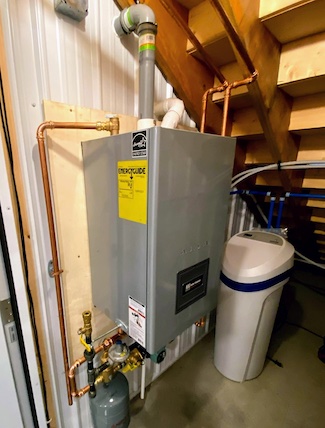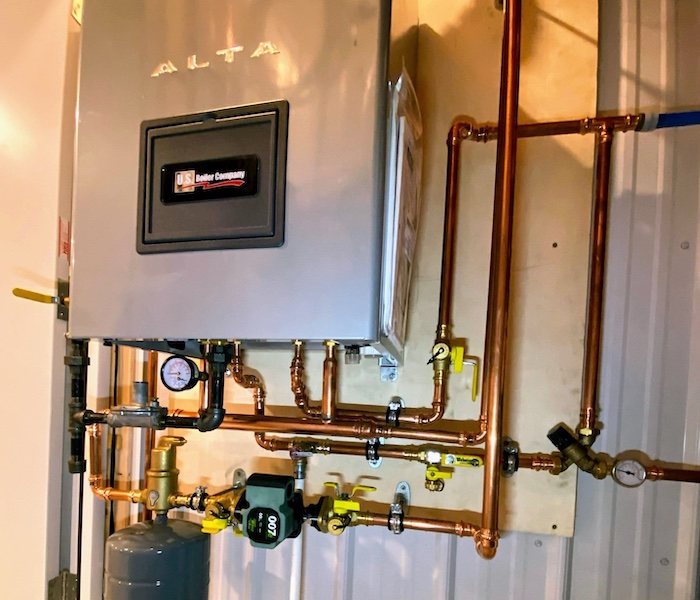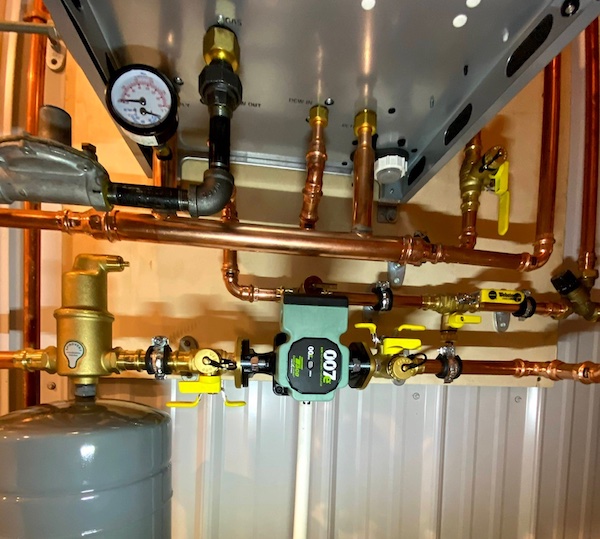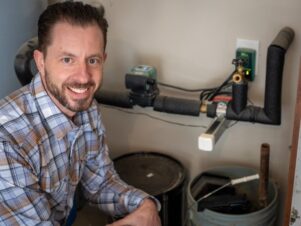“Commercial Condos” are gaining popularity nationwide for small businesses in the service industry. These spaces, typically found in large post-frame buildings, offer a workshop atmosphere perfect for a company with a small fleet of vehicles that’s in need of garage bays, storage space and an office.

Aune installed the combi boiler in a closet below the staircase, protecting the mechanical equipment from activity within the shop.
Property developers and managers have seen increased demand for medium-sized commercial space, and that constructing a large, simple building and dividing it into several smaller spaces has presented a new development option for bare commercial property when a town is already saturated with storage units. For professionals in a variety of trades, the buildings offer everything they need and nothing they don’t, and the spaces can often be rented, leased or purchased outright.
Late last year, Aune Plumbing & Heating was hired to install a hydronic heating system and a plumbing system at a commercial condo in Monticello, Minn. A refrigeration contractor bought the building as a well-insulated shell and required further build-out.
“This was a very simple project,” said Eric Aune, owner of Aune Plumbing & Heating, in Elk River, Minn., and co-owner of Mechanical-Hub.com. “It started like any other hydronic job, with a heat load calculation.”
The spray foam insulation, insulated slab and two walls that are shared with other conditioned spaces kept the heat load low, relative to the condo’s 4,000 square feet and 20-foot ceilings. There’s only one restroom and no full-time occupants.
Combi Is Key
Because the single shower, utility sinks and heated indoor hose bib are used only occasionally, it would have been a waste of space to install a tank-style water heater, especially considering that all mechanical components had to fit under a stairway.
“We suggested the use of a combi boiler,” said Aune. “A tank wasn’t necessary, and there simply wasn’t space for it in the mechanical room, meaning it would have been outside in the garage bays and susceptible to damage.”

The 136 MBH Alta Combi is used to produce DHW for one full bathroom, a utility sink and a heated indoor hose bib, in addition to heating the space.
The system Aune designed includes a single zone of Smith low-temp baseboard radiation paired with a 136 MBH Alta condensing combi boiler made by U.S. Boiler Company, the industry’s first and only 10:1 gas-adaptive combi boiler.
“The 50 feet of baseboard receives a maximum water temperature of 130°F on a design day with an outdoor temperature of -15°F,” said Aune. “When possible, I like to use low-temp baseboard with high-efficiency boilers because it keeps the boiler in condensing mode for as long as possible, similar to in-floor radiant, though not quite to that degree.”
Tight Fit
All mechanical components are contained in a closet under the staircase leading to a storage loft. Even using a small, wall-hung boiler, Aune was cramped during the single-day boiler installation. The system includes a Taco 007e pump for the system and a Caleffi AngleMix thermostatic mixing valve on the domestic hot water side.
“The Alta fit nicely on one wall, but what really helped was the FastPipe premanufactured primary/secondary piping kit that U.S. Boiler Company includes with the boiler,” said Aune. “That reduced the amount of time I spent crammed in the closed. It all installed very quickly.”

Aune found that the FastPipe premanufactured primary/secondary piping kit installs very quickly and easily.
The high efficiency Alta line includes 136 and 200 MBH combi models, as well as heat-only boiler models of 120, 150 and 180 MBH capacities. Its best-in-class gas adaptive technology provides simplicity and rapid installation and optimal efficiency in all variety of outdoor conditions. This technology also provides “no touch” adaptive combustion setup, with no manual throttle or offset adjustments.
The boiler self-calibrates in response to component wear, variation in fuel, environment and vent air pressure. No additional parts are required to convert from natural gas to propane.
Shockingly Simple
“I had never installed an Alta Combi before, so a few things came as a surprise,” said Aune. “I’m very accustomed to installing an outdoor reset sensor, and this boiler doesn’t have one. Instead, the Alta features sensor-less reset, and the boiler modulates water temperature perfectly. I think the unit is running more often than not, which is exactly what a condensing boiler is intended to do. It just runs almost continuously on low-fire.”
The Alta’s sensor-less reset monitors home heat load rather than outdoor air temperature. It assesses home heat input (firing rate) patterns. Monitoring heat load allows boiler water temperature setpoint to be responsive to everything impacting home heat loss, including outdoor air temperature, wind, rain, clouds, home occupancy, and activities like cooking and showering. Once home heat loss is known, the boiler water temperature can be set in very much the same way that outdoor air reset adjusts setpoint.
“The touchless works perfectly, but after installing condensing boilers for years, it definitely felt odd firing this boiler and walking away,” said Aune. “I didn’t have to input any information, and the unit just works as intended. It’s that simple and straightforward.”
Maintaining Temperature
The customer maintains the building at 68°F, and every time Aune has checked, the farthest from setpoint he’s ever seen the temperature is half a degree.
“We also found that the Alta produces domestic hot water very quickly,” said Aune. “There’s never been a complaint about the speed of hot water delivery or hot water volume. I think the owner would literally have to run the shower, the hose bib, and all sinks simultaneously to see the water temperature begin to drop off.”
The boiler has only been running for a month, and an unseasonably warm month at that, but based on how much time the unit spends on low-fire, Aune is confident the owner isn’t going to have any issues with his gas bill.



